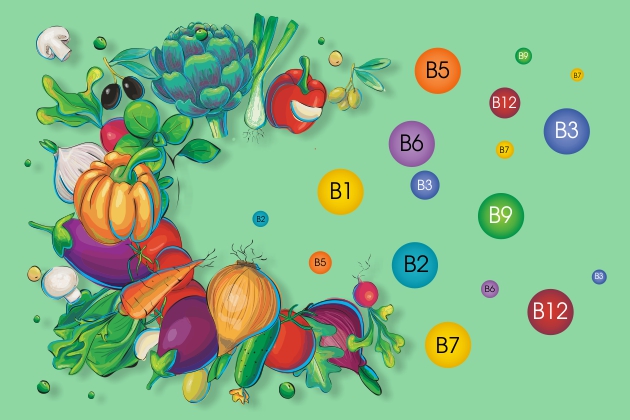
 List Of Foods Rich In Vitamin-B
List Of Foods Rich In Vitamin-B
Vitamin B foods provide adequate amounts of vitamin B needed for optimal health and general well-being. Above all B vitamins consist of eight water-soluble vitamins that are essential for various cellular processes. However, the body cannot store most of these vitamins, and hence they must be consumed regularly in our diet.
Since vitamin B is easily destroyed during food processing, you are at risk of developing vitamin B deficiency. Certainly symptoms of vitamin B deficiency include heart problems; digestive disorders; depression; and poor hair, skin, and nails. If you experience any of these symptoms, visit your doctor or get a Vitamin B Complex Profile done.
The Role of 8 Essential B Vitamins in Our Bodily Functions
| Vitamin | Function |
| B1 (Thiamine) | Breaks down amino acids and sugars |
| B2 (Riboflavin) | Repairs DNA and generates ATP (the body’s energy currency) |
| B3 (Niacin) | Generates ATP |
| B5 (Pantothenic acid) | Breaks down amino acids and sugars; synthesizes amino acids and fatty acids |
| B6 (Pyridoxine) | Synthesizes amino acids |
| B7 (Biotin) | Synthesizes fatty acids and breaks down sugars |
| B9 (Folic Acid) | Produces red blood cells and synthesizes DNA |
| B12 (Hydroxocobalamin) | Synthesizes and repairs DNA, synthesizes fatty acid |
Here we have listed that contain the highest amount of each of these B vitamins.
Vitamin B Foods: Best Foods for Each B Vitamins
1. Vitamin B1
Daily requirement: 1 – 1.3 mg
Foods rich in thiamine include:
- Whole grain or cereal grain
- Asparagus
- Kale
- Liver
- Eggs
- Sunflower seeds
- Pine nuts
- Potatoes
- Tuna
- Pulses (chickpeas, lentils, beans)
- Peas
- Peanuts
2. Vitamin B2
Daily requirement: 1.2 – 1.5 mg
Vitamin B rich in Riboflavin includes:
- Liver
- Mushrooms
- Almonds
- Milk
- Spinach
- Eggs
- Meat
- Fish
- Dairy products
3. Vitamin B3
Daily requirement: 13 – 17 mg
Foods rich in B3 include:
- Fish
- Liver
- Leafy vegetables
- Avocados
- Dates
- Wholegrain cereals
- Cashew nuts
- Pulses
- Meat
- Eggs
- Mushrooms
- Peanuts
- Wheat bran
4. Vitamin B5
Daily requirement: approx. 6 mg
Vitamin B foods rich in B5 include:
- Chickpeas
- Eggs and milk
- Organ meats and beef
- Brown rice
- Mushrooms
- Oats
5. Vitamin B6
Daily requirement: 1.2 – 1.6 mg
Vitamin B foods rich in pyridoxine include:
- Corn
- Banana
- Chickpeas
- Dairy products
- Beef
- Pork
- Yeast
- Fish
- Green vegetables
- Soy
6. Vitamin B7
Daily requirement: 30 – 60 μg
Foods rich in B7 include:
- Green leafy vegetables
- Pulses
- Egg yolks
- Milk
- Nuts
7. Vitamin B9
Daily requirement: approx. 0.4 mg
Vitamin B foods rich in B9 include:
- Leafy green vegetables
- Liver
- Egg
- Citrus fruits
- Lentils
8. Vitamin B12
Daily requirement: approx. 3 μg
Vitamin B foods rich in B12 include:
- Fish
- Meat
- Poultry
- Eggs
Take-Home Lesson
Eat a wide variety of wholesome vitamin foods. In addition, the more you process or cook your food, the more nutrients are destroyed. However, get the right amount of vitamin B from natural foods and watch your body miraculously heal and repair itself.